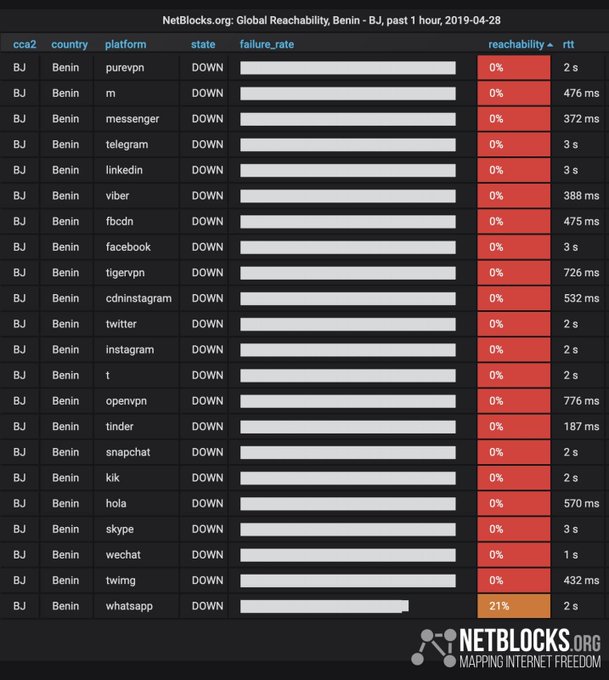Élections législatives au Bénin sans opposition et sans réseaux sociaux
28 Avril 2019
INB1
Le Bénin a commencé a voté dimanche pour élire ses 83 députés, dans un scrutin où seuls deux partis proches du pouvoir ont pu présenter des candidats, et où l’on craint des perturbations et une très forte absentation en signe de protestation.
Les rues de Cotonou, la capitale économique de ce petit pays d’Afrique de l’Ouest, étaient particulièrement calmes et tous les marchés et magasins étaient fermés.
Dans les bureaux de vote, ouverts depuis 7h00 (06H00 GMT), l’affluence était très timide.
“Les populations ne sortent pas, mais c’est à cause des cultes du dimanche”, a justifié Jacques Noutaïs, représentant de la Céna (Commission électorale), à Zè, à une trentaine de kilomètres de Cotonou.
Les principaux partis d’opposition ont demandé à leurs supporters de boycotter le scrutin, où ils n’ont pas pu présenter de candidats pour des raisons administratives.
Le parlement a approuvé fin 2018 la mise en place d’un nouveau code électoral pour simplifier le paysage politique et empêcher la prolifération des partis (plus de 250 dans un pays de 12 millions d’habitants).

Toutefois, même les principaux mouvements de l’opposition ne sont pas parvenus à remplir les conditions imposées par la Céna.
Des échauffourées ont éclaté samedi en fin de journée. Plusieurs routes, vers Calavi ou à Savè (département des Collines, fief de l’ex-président Boni Yayi), ont été bloquées par des manifestants en colère.
Tous les réseaux sociaux ont également été suspendus à partir de minuit, sans prévenir. Le porte-parole de la présidence avait jeudi que la question de couper internet n’avait “pas été discutée”.
Informations sur les Publicités Twitter et confidentialité
“Je ne pense pas que l’on ira jusque là, cela ne fait pas partie de nos pratiques. Mais il y a beaucoup d’intox qui circulent sur les réseaux sociaux, il faut être vigilant pour notre sécurité”, avait déclaré Wilfried Houngbedji.
“La vague d’arrestations arbitraires de militant(e)s politiques et de journalistes et la répression des manifestations pacifiques ont atteint un niveau alarmant au Bénin”, s’est inquiété Amnesty International dans un communiqué publié vendredi soir.
Cinq millions de Béninois sont inscrits sur les listes électorales, et ont jusqu‘à 16h00 pour choisir entre le Bloc Républicain et l’Union Progressiste, deux mouvements proches du président Patrice Talon, accusé d’avoir mis à l‘écart tous ses adversaires politiques depuis son arrivée au pouvoir en avril 2016.
Le Bénin avait la réputation d‘être un exemple démocratique en Afrique de l’Ouest et c’est la première fois depuis l’avènement de la démocratie en 1991 que l’opposition n’a pas de représentation aux élections.
( ENGLISH )
Benin began voting Sunday to elect its 83 deputies, in a poll where only two parties close to power were able to submit candidates, and where there is fear of disruption and a very strong absentee in protest.
The streets of Cotonou, the economic capital of this small country in West Africa, were particularly quiet and all markets and shops were closed.
At the polls, open since 7:00 am (0600 GMT), the affluence was very shy.
"The populations do not go out, but it is because of the Sunday cults," justified Jacques Noutais, representative of the Cena (Electoral Commission) in Zè, about thirty kilometers from Cotonou.
The main opposition parties asked their supporters to boycott the polls, where they could not run candidates for administrative reasons.
The parliament approved in late 2018 the implementation of a new electoral code to simplify the political landscape and prevent the proliferation of parties (more than 250 in a country of 12 million inhabitants).

However, even the main movements of the opposition failed to fulfill the conditions imposed by the Cena.
Scuffles erupted Saturday late in the day. Several roads, towards Calavi or Savè (Department of the Hills, stronghold of the former president Boni Yayi), were blocked by angry protesters.
All social networks were also suspended from midnight without warning. The presidential spokesman said on Thursday that the issue of cutting off the internet had "not been discussed".
Twitter Advertising Information and Privacy
"I do not think we'll go that far, it's not part of our practice. But there is a lot of intox that circulate on social networks, we must be vigilant for our safety, "said Wilfried Houngbedji.
"The wave of arbitrary arrests of political activists and journalists and the repression of peaceful protests has reached an alarming level in Benin," Amnesty International said in a statement released Friday night.
Five million Beninese are registered on the electoral lists, and have until 16:00 to choose between the Republican Bloc and the Progressive Union, two movements close to the president Patrice Talon, accused of having put aside all its political opponents since taking office in April 2016.
Benin had the reputation of being a democratic example in West Africa and this is the first time since the advent of democracy in 1991 that the opposition has no representation in the elections.
/image%2F2644156%2F20230522%2Fob_8664ae_img-1834.jpeg)





/image%2F2644156%2F20211113%2Fob_114308_20211111-070542.jpeg)
/image%2F2644156%2F20210524%2Fob_1bef97_20210523-205552.jpeg)
/image%2F2644156%2F20210522%2Fob_6a5d3a_763.jpeg)
/https%3A%2F%2Fi.ytimg.com%2Fvi%2FvmkrjUUafuk%2Fhqdefault.jpg)